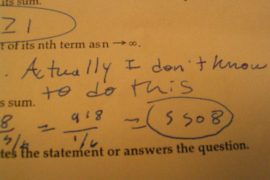I’ve been talking with grownups about math for more than three years now. Parents, 20-somethings, writers, DIYers, seniors… they all have something in common: a piss-poor relationship with math.
This bad attitude is probably your fault.
The stories I hear — over and over and over again — all point to a major breakdown in the educational system. Sure, we can blame standardized testing or the state standards themselves. Middle school teachers can blame elementary school teachers. High school teachers can blame middle school teachers. College professors can blame high school teachers. And by all means, let’s not leave out the parents.
But you, dear math teacher, have control over only one thing: yourself. So what are you going to do about it? Here are some ideas.
Be Nice
If I hear one more math teacher opining about how dumb his students are, I think I might scream. Why do people teach, if they don’t like their students enough to be nice to them? Your students aren’t dumb. They’re uneducated. And guess whose job it is to educate them? If they come to your class unprepared, tough noogies. You get the kids you get. You were hired to overcome those obstacles. That’s the job, and if you can’t deal with it, perhaps this isn’t the right profession for you.
Don’ take your frustrations out on your students. Quit talking down to them. Quit berating them in public. Quit rolling your eyes or slamming doors. Be a grownup. They’re kids, and they respond to kindness and respect. Give it to them, and you’ll likely see motivation.
Inspire
You don’t have to be Martin Luther King, Jr. or Oprah. But lose the this-is-good-for-you-so-do-what-I-say attitude. It doesn’t work.
Look, you teach math for some important, personal reason. What is it that motivates you? Dig deep, find that thing, and share it with your students. Go for that spark every single day. It’ll make you feel better and get your students motivated.
It’ll also make your job MUCH easier. An inspired kid will work, will stop playing around when you ask her to, will make deeper connections. An inspired kid will meet you halfway. This gives you more energy to devote to that kid who is still messing around in the back of the room or who is ready for the next unit before the rest of the class. Inspiration means autonomous learning.
Teach Students, Not Math
Wait, did you actually think you were going to teach math? Sorry, but that’s not the job. Math teachers don’t get to immerse themselves in math all day long. Nope, your job is to teach kids. Whiny, pain-in-the-butt kids who are more interested in last night’s episode of Pretty Little Liars than their upcoming geometry test. BECAUSE THEY’RE KIDS!
Whether you like it or not, most of your students don’t give a flying flip what x is. Most adults don’t care either. You want your students to learn math? Recognize each and every student as a person, not a container to be filled with math facts. Let them experience the subject for themselves. Let them teach you.
The most effective teachers have students who will follow them to the ends of the earth. And that’s no accident. Students of all ages can spot a bullshitter in two seconds flat. They yearn for genuine relationships with adults. You give them that when you recognize that math isn’t the be-all-end-all of their day. You give them that when you see them as a whole person, not just a math student.
Be Real, But Not Too Real
Having a bad day? Own it. Frustrated with how things are going? Take responsibility. All classrooms — even the most traditional — are two-way streets. When you are real with your students, they’ll be real with you.
But expect to get some pretty raw stuff in return. Kids can’t act like adults, because — guess what? — they aren’t gown up yet. You’re modeling for them every, single day what it’s like to be a grownup. When you react to their realness with childish behavior, well, that’s a pretty strong message.
And for goodness sakes, draw some lines. Sure, you hate standardized testing. (What teacher doesn’t?) But really, do you need to share that ad nauseam with your students? Heck, you might have tremendous disdain for how administrators are running the place, but keep your trap shut on that subject. These kids aren’t your friends. And again — they’re not grownups.
Notice something? There’s not a single number, mathematical concept or teaching strategy in the above advice. I really believe this from the bottom of my heart: It’s not about the math. It’s about how you relate to your students. Every.single.time. You have way, way more power than you can even fathom. Your students carry the messages you send to them — throughout their lives. Try it. Ask five friends about their math education. I guarantee that four of them will have detailed, sad stories about why they hate math.
You have a chance to turn this around for thousands of students. And honestly, if you’re not up to the task, get out of the freaking way. Let someone else do it. Because you can do a hell of a lot more damage to one student than a kid could ever do to you.
Sincerely,
Laura Laing (informal therapist to math-haters of all ages)
